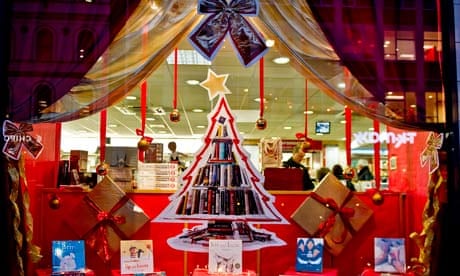It has been a watershed year for the book business. Borders went under. The iPad transformed electronic reading. The ebook took off, touching $1,000m sales in the US alone. In Britain, the best independent booksellers began to recover their mojo.
Mixed signals are an inevitable phenomenon in such a changing cultural landscape. So, at the same time, it has hardly been a vintage year for prose. As the Observer reported last week, the art of biography seems to be in the doldrums, squeezed at the low end by celebrity lives such as Wayne Rooney: My Story So Far, and at the high end by classic memoir, for instance Edmund de Waal's The Hare with Amber Eyes.
In fiction, if there's a new generation to follow Zadie Smith and Hari Kunzru it's taking its time. The Booker prize was disputed between two senior citizens, both in their late 60s, a two-time winner (Peter Carey) and a three-time loser (Howard Jacobson). In the end, The Finkler Question sucked up all the oxygen. None of the new names on the shortlist really got a look-in.
In the real world, the fall of New Labour brought the political autobiography roaring back with a vengeance. Tony Blair's A Journey is said to be largely a work of fiction. That didn't stop it storming to the top of the charts, followed closely by Peter Mandelson's The Third Man. A runner-up in this race, George Bush's Decision Points, has scored a lot of column inches, but only the anoraks of the political class will have it on their Christmas list. Ulysses S Grant's reputation as the author of by far the best presidential memoir looks secure.
The Christmas book list also looks different this year, thank God. Austerity appears to have killed off stocking fillers such as Do Ants Have Arseholes and Toujours Tingo as redundant and vexatious. The windows of bookshops will still be piled high with Nigel [Slater] and Nigella [Lawson], but for the first time the Kindle is being aggressively marketed as a gift item. This is the future, and it glows like ET.
Interpreting this picture is a complicated dialectic between doom and destiny. Before we declare the arrival of the Visigoths and the end of civilisation as we've known it, I believe that many of the clouds hanging over a troubled literary landscape have silver linings. More people are reading more books in more formats than ever before. Book festivals are booming. Literary prizes are generating oodles of book-related publicity. At a local level, for example east London's Ministry of Stories, creativity is flourishing. The book club, once a subject for fascinated commentary, is now a routine part of everyday life.
Austerity can even be bracing. The world of books, which spent most of 2009 wailing about the slump in advances, is pulling itself together. Literary agents, a threatened species, are finding new ways to promote their clients. Several have set up shop as speaking agents, selling lectures and author appearances. Even in hard times, there is always a literary marketplace, and this one remains extraordinarily robust. So I, for one, do not repine. From some points of view there is a literary bonanza going on. You may not like it, but it is indisputable.
Publishers are natural enthusiasts for whom the glass is always half full. My only worry about the surprising resilience of this time-honoured market is that the optimists will be encouraged to carry on drinking in the last chance saloon, in the hope that they can survive the remorseless logic of digitisation. This year has demonstrated that change is here to stay, and moreover that the reading public is beginning to acclimatise to a new world order for books. Writers, booksellers, editors and agents are advised to take note.
I had an interesting exchange with a senior publisher last week who, among other things, said: "The endless doom-mongering is making everyone panicky and inert. The truth is: we're about to enter a time of unprecedented opportunity for books that are not mass-market. We now know where readers like us, and who like us, gather. Social networking is a gift for literary enthusiasts."
Once the marketplace and the social network become fully integrated the world of books will never be the same again.
Biblical epic to be staged in Bath?
Last week, I wrote about the quatercentenary of the King James Bible, regretting that none of the great literary festivals had plans for a public reading of this astonishing monument of English prose. At five minutes a page, I reckon that a complete reading of the KJB would take about four days. If we can do it (on 16 June, Bloomsday) for an Irishman, James Joyce, why ever not for Scottish King James? I'm happy to report that novelist James Runcie, director of the Bath festival, is looking into the idea. Let's hope the people of Bath will rally to his side.
Jesus tees off on the fairway to heaven
My book of the year is Christopher Isherwood's Diaries Volume Two: The Sixties (edited by Katherine Bucknell). It's rather a sad book, but it has some great jokes, like this one about Jesus and the Blessed Virgin Mary, who are playing golf. The BVM, on top form, lands on the green. Jesus slices and lands in the bushes where a squirrel picks up his ball, but is grabbed by a dog, whereupon an eagle swoops down and carries squirrel, dog and ball high into the air. Then a lightning bolt strikes the eagle, which drops the dog, which drops the squirrel, which drops the ball, which rolls into the hole. The BVM throws down her club, and exclaims indignantly. "Look, Jesus, are you going to play golf, or just fuck around?"

